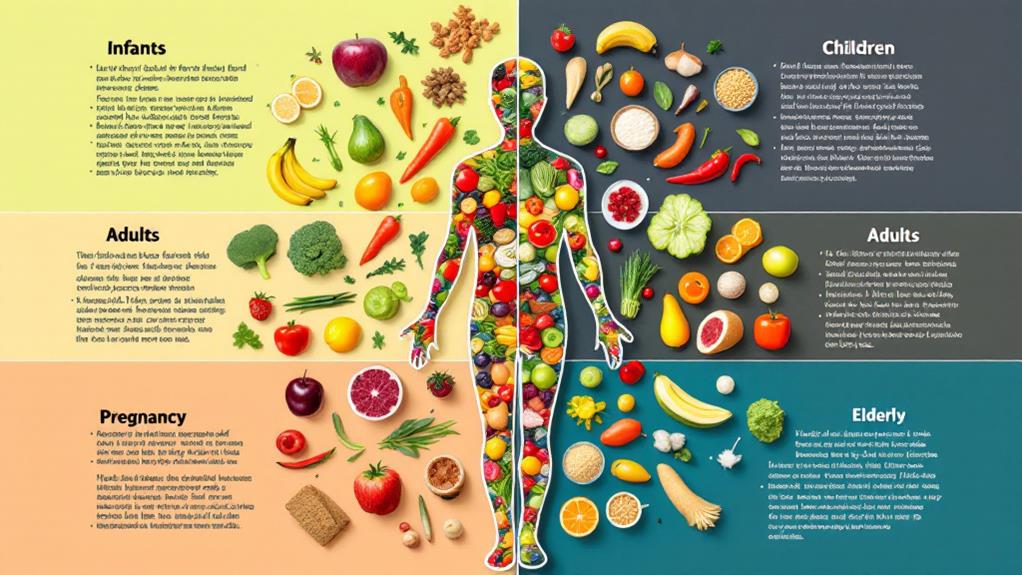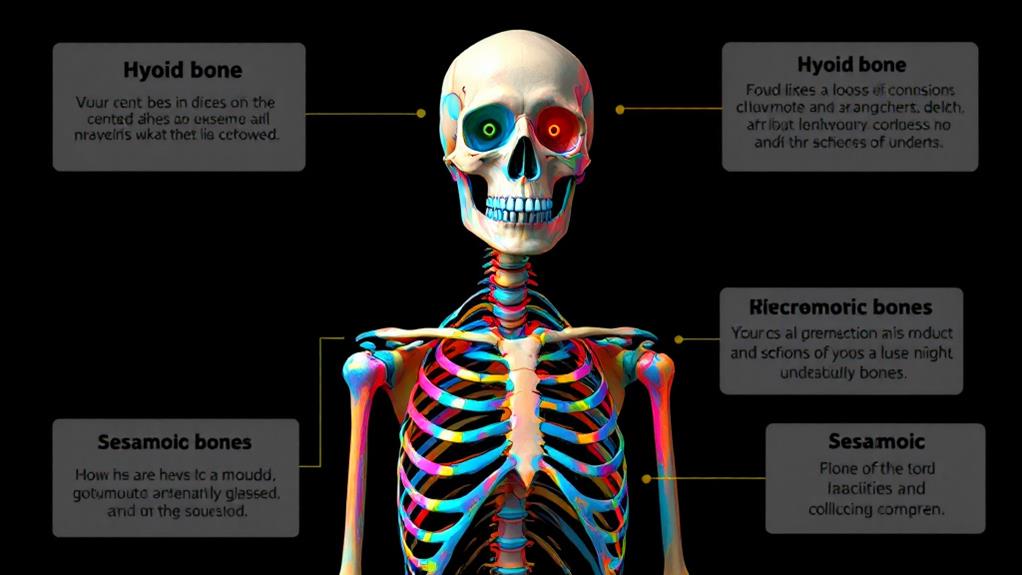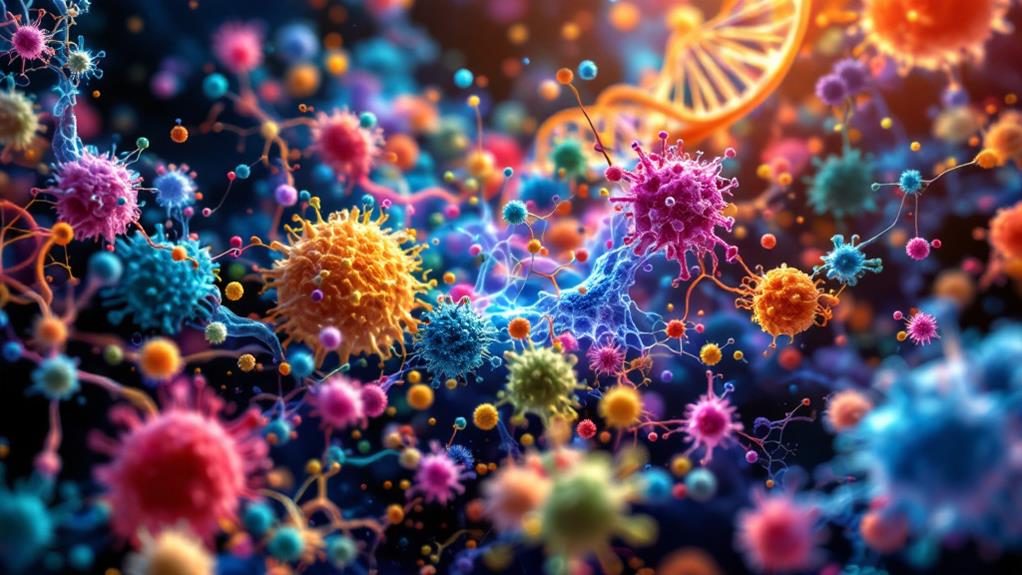A Complete Guide to Nutrition: Understanding What Fuels the Human Body

Nutrition is the cornerstone of your health, providing the fuel your body needs to thrive. You'll need a balanced intake of macronutrients—carbohydrates, proteins, and fats—along with essential vitamins and minerals. Understanding calories and energy balance is imperative for maintaining a healthy weight. Don't forget about hydration; water plays a pivotal role in numerous bodily functions. Your nutritional needs will change throughout different life stages, from infancy to senior years. By grasping these fundamental concepts, you'll be better equipped to make informed dietary choices that support your overall well-being. Explore deeper to uncover the complexities of each nutritional component.
Macronutrients: The Body's Building Blocks
With a focus on the essentials, macronutrients form the foundation of our diet. These pivotal components consist of carbohydrates, proteins, and fats, each playing a vital role in your body's functions. Carbohydrates are your primary energy source, fueling your brain and muscles. They come in two forms: simple sugars for quick energy and complex carbs for sustained release. Proteins are the building blocks of your body, paramount for muscle growth, tissue repair, and enzyme production. You'll find them in meats, dairy, legumes, and plant-based sources.
Fats, often misunderstood, are indispensable for hormone production, nutrient absorption, and cell membrane structure. Don't shy away from healthy fats like those found in avocados, nuts, and fish. It's important to balance your macronutrient intake for ideal health. Remember, your body needs dietary fiber, a type of carbohydrate that aids digestion and promotes gut health. Aim for a varied diet that includes whole grains, fruits, vegetables, lean proteins, and healthy fats to guarantee you're getting all the macronutrients your body needs to thrive.
Essential Vitamins and Minerals
While macronutrients form the foundation of our diet, vitamins and minerals are the catalysts that enable our bodies to function ideally. These micronutrients play pivotal roles in various bodily processes, from bone formation to immune system support. You'll find vitamins in two forms: fat-soluble (A, D, E, K) and water-soluble (B complex, C). Minerals, such as calcium, iron, and zinc, are equally important for maintaining excellent health.
Micronutrient deficiencies can lead to serious health issues, affecting growth, cognitive function, and overall well-being. For instance, a lack of vitamin D can weaken bones, while iron deficiency may cause anemia. To prevent these problems, you should consume a diverse diet rich in fruits, vegetables, whole grains, and lean proteins.
Many vitamins, particularly C and E, possess antioxidant properties that protect your cells from damage caused by free radicals. This protection can help reduce the risk of chronic diseases and slow down the aging process. Remember, while supplements can be beneficial, it's best to obtain your vitamins and minerals from whole foods whenever possible.
Understanding Calories and Energy Balance

Calories are the units we use to measure the energy content of food and beverages. Your body needs a certain amount of energy each day to function properly, and this energy comes from the calories you consume. Understanding energy balance is imperative for maintaining a healthy weight and overall well-being.
Energy balance occurs when the calories you consume equal the calories you burn through daily activities and exercise. If you consume more calories than you burn, you'll gain weight. Conversely, if you burn more calories than you consume, you'll lose weight. To maintain your current weight, you need to strike a balance between intake and expenditure.
It's important to ponder not just the quantity of calories, but also their quality. Nutrient density refers to the amount of nutrients a food provides relative to its calorie content. Focus on consuming nutrient-dense foods to guarantee you're getting essential vitamins and minerals while managing your calorie intake.
Pay attention to portion sizes, as they directly impact your calorie consumption. By understanding and controlling portion sizes, you can better manage your energy balance and achieve your nutritional goals.
Hydration and Nutrition
In addition to proper nutrition, adequate hydration plays an essential role in maintaining your body's health and function. Water is pivotal for numerous bodily processes, including temperature regulation, nutrient transport, and waste removal. Your fluid intake needs vary based on factors like age, activity level, and climate.
Proper hydration isn't just about drinking water; it's also about maintaining electrolyte balance. Electrolytes are minerals in your blood that help regulate various bodily functions. You can maintain this balance by consuming a variety of fluids and foods rich in electrolytes.
Aim for 8-10 cups of fluid daily, adjusting based on your needs. Monitor your urine color; pale yellow indicates good hydration. Increase fluid intake during exercise or hot weather. Consume electrolyte-rich foods like bananas, leafy greens, and yogurt.
Nutrition for Different Life Stages

Nutritional needs evolve throughout our lives, adapting to the body's changing requirements at different stages. As an infant, you require nutrient-dense breast milk or formula to support rapid growth and development. During childhood and adolescence, your body demands increased calories and nutrients to fuel physical and cognitive development.
In adulthood, your focus shifts to maintaining a balanced diet for optimal health and weight management. You'll need to adjust your caloric intake based on activity levels and metabolism changes. For women, pregnancy and breastfeeding require additional nutrients to support fetal development and milk production.
As you enter your senior years, healthy aging becomes a priority. You'll need to pay closer attention to nutrient absorption, as your body may become less efficient at processing certain vitamins and minerals. Calcium and vitamin D intake becomes indispensable for maintaining bone health, while protein helps preserve muscle mass.
Throughout all life stages, it is crucial to stay hydrated, consume a variety of whole foods, and limit processed items. By tailoring your nutrition to your current life stage, you'll better support your body's changing needs and promote overall health.



